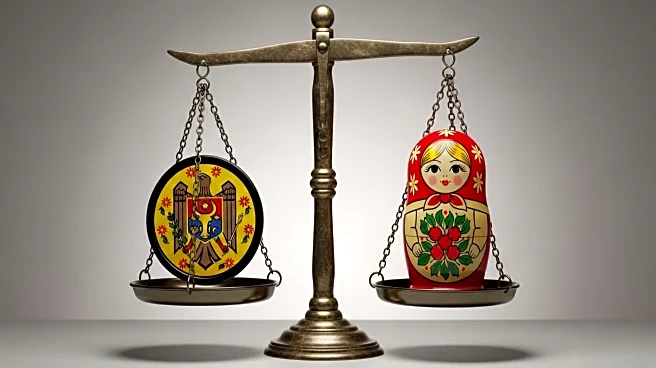What's Happening?
Moldova has concluded its parliamentary election, a pivotal event marked by allegations of Russian interference. The election is seen as a critical decision point between aligning with the European Union or moving closer to Moscow. The pro-Western Party of Action and Solidarity (PAS), which has held a parliamentary majority since 2021, faces opposition from several Russia-friendly parties. Moldova's President Maia Sandu and other officials have accused Russia of attempting to influence the election through various means, including vote-buying and cyberattacks. Despite these challenges, over 1.59 million voters participated, including a significant number from the Moldovan diaspora. The election results are expected to shape Moldova's geopolitical direction.
Why It's Important?
The outcome of Moldova's election holds significant implications for the country's future political alignment and stability. A victory for the pro-European PAS could strengthen Moldova's ties with the EU, potentially enhancing regional security and economic prospects. Conversely, a shift towards Russia-friendly parties could alter Moldova's foreign policy and impact its relationship with Western allies. The allegations of Russian interference underscore ongoing geopolitical tensions in Eastern Europe, highlighting the strategic importance of Moldova in the broader context of EU-Russia relations. The election also reflects the challenges faced by smaller nations in maintaining sovereignty amid external pressures.
What's Next?
As Moldova awaits the final election results, the country faces potential unrest and political uncertainty. Authorities have warned of possible protests and destabilization efforts by groups opposing the pro-European government. The new parliament will play a crucial role in nominating a prime minister and forming a government, which will require parliamentary approval. The international community, particularly the EU, will be closely monitoring the situation, as Moldova's political direction could influence regional dynamics. The Moldovan diaspora's influence in the election may also prompt discussions on the role of external voters in shaping national policies.
Beyond the Headlines
The election in Moldova highlights broader issues of electoral integrity and the impact of foreign interference on democratic processes. The allegations against Russia raise questions about the effectiveness of international measures to prevent such interference and protect sovereign elections. Additionally, the economic challenges faced by Moldovans, including inflation and poverty, may influence voter sentiment and the country's political landscape. The situation in Moldova serves as a reminder of the complex interplay between domestic politics and international relations, particularly in regions with historical ties to both Western and Eastern powers.









